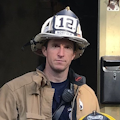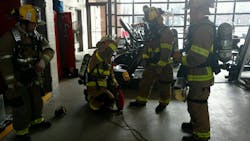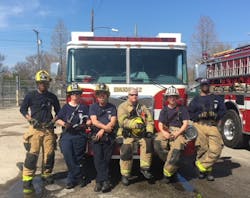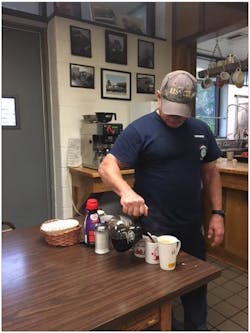Company Officers Are the Mortar in Your Fire Department
Driving around on any given day you will see buildings lining the streets of your run districts. Some of these buildings are made of brick or at least have a brick veneer. If we break down the parts of this wall, we can identify one critical component—the mortar. Look at the entire wall as your organization and the bricks as individual firefighters. That leaves the mortar holding it all together. If we look at the definition of mortar in a fire service textbook, it is defined as “an inherent part of most masonry construction. The primary function of mortar is to bond individual masonry units into a solid mass.”
Just as brick mortar holds a wall together, the company officer plays a critical role in holding together their organization by serving as fire service mortar. We all want to have great leadership at all levels, but if an organization has great leadership at the top and brittle leadership at the company level, there is a greater chance for collapse. Company officers need to realize how important their role is to the survival and long-term effectiveness of their fire department. Just because everyone comes to work in the same uniform doesn’t make them a team; they are simply co-workers. It takes time, energy, frustration and passion to build a prideful team. My goal with this article is to share just a few ideas/concepts that will help you as the company officer build a team of performers.
Establish credibility
One of the first things an officer needs to have is credibility. It should not take anyone long to learn that people in the fire service have long memories. I have known firefighters who can’t crawl out from underneath a rough probationary year. What you do to prepare for your role will build your credibility when you step into it.
As a firefighter, are you a student of the fire service? Do you have the TV remote memorized, but not the rig? When you place those trumpets on your collar, can you practice what you preach without hesitation? Realize the importance of preparation. Realize that it is no longer about you, it is about your crew. Attend classes, seminars and other hands-on training. Take leadership courses, but keep your hands on some hoselines, ground ladders and saws; after all, you will be the one responsible for passing it on and being an instructor in your station. The last thing anyone wants to see is an overnight sensation. You know the kind, they get the trumpets on their collar and immediately try to preach about fitness, training, education, etc. All the while, before they were promoted, they didn’t make any of this a priority. Firefighters want to work for officers who set the example. This is at the absolute core of everything you do. Proper preparation for the role will make you that much more prepared when you step up to sit in the right front seat.
Two principles
When I tell you to remember where you come from, that comes in many forms. What it really boils down to is empathy. I am not talking about the kind of empathy where you own someone’s emotions as your own and make irrational decisions, but rather the kind where you take someone’s circumstances into consideration and make the best decisions based off logic. Put simply, how would you feel, or how did you feel, in their position? When you sit someone down for a performance evaluation, remember how you felt when you got yours from your company officer. When you sit someone down to counsel them, remember the emotions you may have felt in that spot before. Stay grounded and stay connected.
Looking out for your people truly means looking out for them. I didn’t say cover things up for them; I said look out for them. That means their welfare, their professional development and more. This is where the accountability piece comes in. Hold your folks to a standard. One of my favorite quotes is from General Bruce Clarke: “You owe it to your people to require standards which are for their benefit, even if they may not be popular at the time.” Your firefighters need to know that when they are right, you will back them up, but when they are wrong, they will be held accountable. Looking out for your people means caring enough about them to push them into a position where they may become uncomfortable. We have another word for uncomfortable in regard to teams; that word is growth. These two principles will help keep you focused on your priorities inside the firehouse and keep you focused on the direction you need to take to ensure that every one of your firefighters is trained and prepared when the bell hits.
Crew size-up
One thing I think we do a pretty well is sizing up buildings. We put in the time to practice by looking at structures and debating where the first line would go if the fire was in a particular location. Where should the water supply come from? How do we ventilate and where do we start our search?
Let me ask you this: How often do you practice sizing up your crew? How much do we really study our folks? Most company officers aren’t going to fires every day, but they are dealing with people every day. How are we to build strong teams if we don’t get to know who is in the firehouse with us? The answer: You won’t. As a company officer, get to know as much as you can about your people. What they do for fun, how they met their spouse, and their kids’ names. Find out what angers them, drives them or inspires them. What are their strengths and weaknesses? Once you size-up your crew, you can begin to get a little deeper into the team building process. If you skip this part all together, you may find yourself chasing your tail even after setting expectations.
Be an involved officer
Being an involved officer means being visible around the station and not confined to that nice new (or shaggy old) bunkroom of yours. If there is one thing that frustrates me to no end it is a company officer who is only to be seen when the bell hits for a call or it’s the dinner bell ringing. Be visible to your crew.
Years ago, when military officers rode on horseback, the soldiers could always tell which officers were the good ones, the ones who truly cared about their men. Richard Neustadt of Harvard University said about George Washington that it wasn’t his generalship that made him stand out, it was the way he attended to and stuck by his men. His soldiers knew that he cared for them and would share their hardships. Years later, Robert E. Lee earned the same respect from his soldiers by getting off his horse when visiting the camps. He would eat the food they were eating, hear the rumbling of their bellies, and even sleep in their tents. You see, the best officers, get off their horses and feel the pulse of their crew. It is critical that you do this so you can understand what is being said, talked about and more. It will allow you to understand the needs of your crew. The best officers also get involved in training and don’t just sit on the sidelines. The best officers lead by example!
Training time
So now that I mentioned training, let’s talk about it for moment. Being an instructor is another one of the many hats you will wear as a company officer. Making sure your crew is trained benefits the public, the crew and their families who get to see them in the morning. Training is one of the most important things you can do to increase your crew’s chance of survival. If done right, training will not only build efficient operations, it will build morale. So how do we do it right? We keep it relevant, we mix it up. If you have opportunity to use vacant or abandoned buildings, do so. You can only search the bunkroom so many times before you start to memorize it. Keep your training as realistic as possible. Mix it up a little bit. One day you may be in turnout gear, the next you may be around the galley table. One day you may be flowing water and the next reviewing an EMS protocol. Changing up your training will make your crew well-rounded and more likely to stay engaged.
High standards
It is also important to hold your crews to a high standard. I am sure there will be times when they may feel like you push too hard, and you need to listen. I am not saying stop, but listen. In my experience, the push back will come from poor training or instruction or it will be because the company officer who was there before you did no training at all and did not hold them to any type of standard. Another great quote from General Clarke goes like this: “You owe it to your men to require standards which are for their benefit even though they may not be popular at the time.” Think about that as the company officer. Hold yourself and your crew to a high standard. They may not thank you now, but seeing them go home after every shift will make it all worth it. Remember, placing Everyone Goes Home stickers on your car and painting the slogan on your bay doors doesn’t get people home; it’s our actions as company officers that make it happen, and one of the biggest ways is through good training.
Create positive change
It’s not unusual for me to hear things like, “I wish our leadership would show more recognition or support.” I hope everyone reading this gets the support they deserve and are recognized for their hard work. The sad reality is more often than not, that isn’t the case. So what can you do if you aren’t getting the support and recognition you need? Make it happen from right where you sit. There are ways to recognize people and show value right from where you are as a company officer.
Another simple gesture is getting a small gift for probationary firefighters as a way to say thank you for the hard work and welcome to the team. This memento, keepsake or whatever you want to call it is something the probie can look back on in 25 years and remember each of those crewmembers and how they all mentored him his first year. It is gestures like these that get it all started. If things like this don’t happen from the top down, then start a trend. Just one more nugget for you to use if you’d like. When someone checks into my station, they get a station patch and coin on the first day. This small gesture sets the tone from the beginning. It shows them that we take pride in who we are, and they are now a part of this team. It quickly introduces the right mindset to that person. Maybe one day your actions at the company level will inspire others to do the same and before you know it, you have made some positive change.
Offer feedback
I grew up playing sports and can tell you that being a company officer is very similar to being a coach. One thing I feel that coaches do a little better than us involves evaluation and feedback. Coaches are constantly talking with their players about expectations, what they could have done better, how to take steps toward improvement, and more. This is how a company officer should treat a performance evaluation. If you are tasked with giving a performance evaluation, take them seriously! Far too often I see dishonest evaluations given to firefighters because an officer is afraid to hurt feelings or doesn’t want to be seen as the bad guy. Many times the truth is avoided in order avoid conflict. it is sometimes necessary to have those difficult conversations. You will do no good to that firefighter who lacks in their performance if you give them a “meets or exceeds expectations” grade just so you can check the complete box on the evaluation and avoid any type of solution. In the end, you are just hurting them, the crew and the public. Be honest with them about their evaluation. If they are off the mark, tell them why and come up with solutions on how to improve. Be a coach and constantly communicate over the course of the year. Document all relevant information so when it’s time for the yearly evaluation, there should be no surprises. The evaluation just serves as a time to revisit topics you have already discussed and/or are working on.
In sum
In closing, let me remind you that you are a walking, talking officer development program. People are watching everything you do and say. You have an opportunity as a company officer to turn the tide in your organization. Be true to the oath you swore and remember to keep your priorities straight when you are at the firehouse. Every one of us wants to leave a legacy when we walk away from the fire service. Years from now, when you are gone and the people you were privileged to lead are still here, what will they say about you as a company officer? What will they say about how you were as a leader? They may not remember the certifications you had, degrees you held or the rank from which you retired. While all those things are still important, they are not as important as what you taught them and how you made them feel. This is what they will remember. Your example is what they will use to mentor those in their charge when the time comes, and this is why the role of the company officer is so critically important to a long-term healthy-running organization. Look out for your people. Remember where you came from. Take your job as a company officer very seriously. People are counting on you.
About the Author

Jarrod Sergi
Jarrod Sergi is an 18-year student of the fire service, spending the last 13 years with Norfolk, VA, Fire Rescue, where he is a captain of an engine company. Sergi has assisted in the development of multiple department-wide and regional training programs covering fireground operations and fire dynamics. He is a state instructor for both the Virginia Department of Fire Programs and the National Fire Academy focusing on mayday and strategy/tactics. Sergi is a graduate of the National Fire Academy’s Executive Fire Officer Program and founder of Trial by Fire, whose mission is to advance the fire service through strong leadership, accountability and training.


